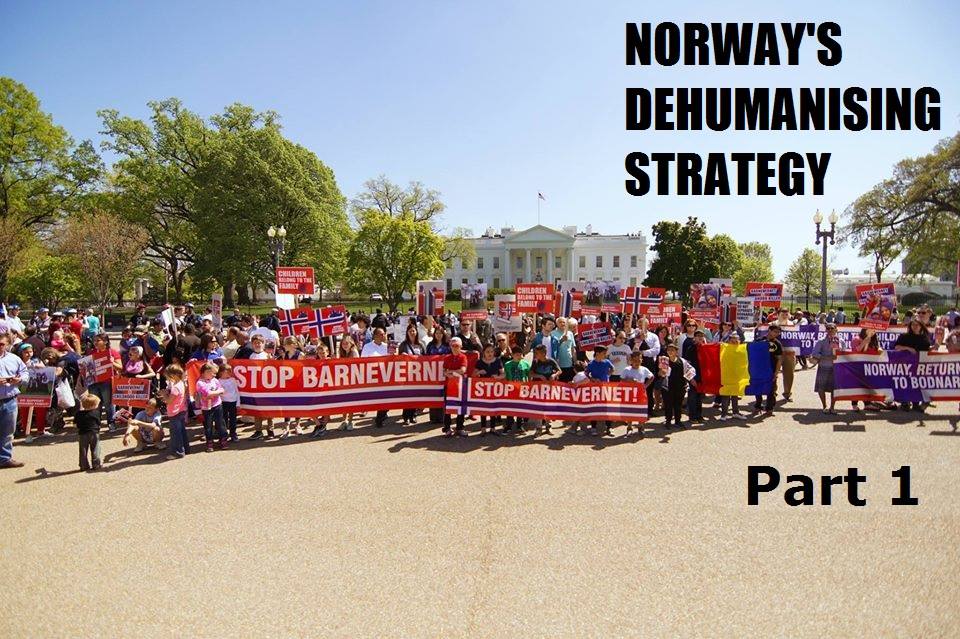
The question that many people ask is how can a State funded organisation take thousands of innocent children from perfectly able and caring parents?
How does the «superior Nordic race» in Norway justify their reckless and senseless deeds?
Part one in this series will explore the inhuman ideology that has created superior and inferior groups of people in Norway.
Margaret Hennum lifts the lid on Norway’s Child Welfare System, barnevernet, and its inhuman ideology, that disregards the most basic Human Rights and dignity, especially of the most vulnerable – innocent children:
By Margaret Hennum
I am a pediatric nurse with 40 years of work experience from the healthcare sector. With increasing knowledge of the barnevernet working methods, it has struck me that they have a different view on people than I know from my own professional life.
Frustrated and heavily tested parents report of a child welfare system that does not create dialogue, but only observes, commands and reports. Frustrated health workers, teachers, day care workers and child welfare workers report of a child welfare system that does not create dialogue but requires just reporting.
«Sveket» («Betrayed») by Kari Killén, is the basic book on childcare failure in the education of barnevernet workers. This book is written based on her opinion of a mother who did not want her child as she herself stated at a seminar in Molde in 2009.
In this textbook, page 505, Killén writes:
«Those parents who are unable to give their children a good care situation are rarely able to grieve coherently over time.
The ideal mourning work, as stated in the literature with the perception and treatment of reactions after loss and the relationship to the lost, must be modified in this work. Often it will be difficult to engage parents who have a bad perception of the child and who have previously been able to engage in it, in this process.
For parents whose behaviour is characterized by extensive immaturity and where the child has been the caregiver, the need for care seems to be more intrusive than grief. In these situations, it is important to prioritize providing care to the parents. They may otherwise make it difficult for the child to adjust in the placement process by directing their aggression towards the child. «
Killén also claimed at this seminar in Molde that the parents who do not give good care to their children are rarely able to learn this.
Norway’s Child Welfare System dehumanises parents, and I think these statements from Killén explain why. The statements are based on her ideas, they are not anchored in research. In her book, Killén has a long reference list of research reports. But where she relies on research in the text, it would have been helpful with reference to what research she is basing her statements and conclusions on! The lack of such, makes it impossible to test her claims in relation to the reference material.
Child Welfare Services produce a large number of child welfare cases based on statistics (see short article from Berit Aarset about how barnevernet uses so-called trump cards / puzzle game building to create things. The methods are described in the book entitled «Justification of Care Orders» by Elisabeth Backe Hansen).
The dehumanisation that social workers are taught through their studies, makes them treat a person as an «Untermensch», a familiar term from Europe in the 1930s and 1940s.
Joar Tranøy, a psychologist, who has put a big spotlight on the dysfunctional Norwegian Child Welfare System, claims that such treatment of parents as committed by barnevernet, is copied by the rest of society after time (stigmatisation).
Dehumanisation in child welfare threatens the legal security of the parents and violates human rights for both children and their families (e.g. Norwegian TV2 news reports in 2016/2017 on parents with allegedly a low IQ score and, for that reason, they have been deprived of their children).
Joar Tranøy writes in the book «The fight for the child’s best interest» how human opinion is expressed in barnevernet work:
- The child welfare services consistently consider the child’s best interests as contradictory to the interests of the parents.
- Mistrust of parents’ explanations, competence, knowledge, situation descriptions and situational understanding / reality perception.
- Parents arguments are not discussed and are not considered.
- Good cooperation is defined by barnevernet as the parents do as barnevernet says and agree to barnevernet as the experts and that barnevernet knows everything better than the parents.
- Conflicts between barnevernet / foster parents and parents are always considered by barnevernet as the parents’ fault.
The German-American psychologist Wolf Wolfensberger stated:
«The most serious devaluation happens when we collectively or as an entire community devalue others collectively (as a group or class). This devaluation on a «higher level» is the most drastic, because it creates a society that devalues others through class status, which results in the systematic ill-treatment of citizens and of the social structure, including the community’s help. » (Wolfensberger, 1992)
Har du meninger? Send oss din mening. Følg oss på Facebook!
Leave a Reply